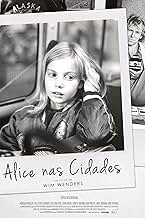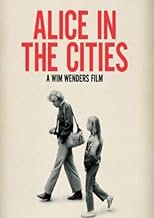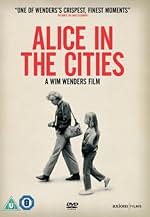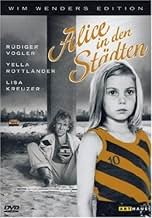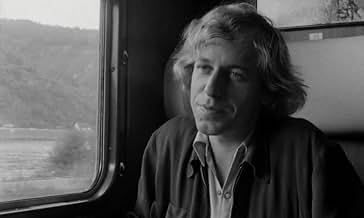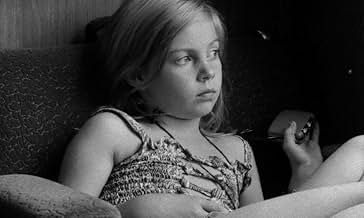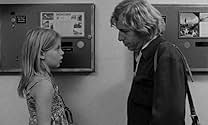अपनी भाषा में प्लॉट जोड़ेंA German journalist is saddled with a nine-year-old girl after encountering her mother at a New York airport.A German journalist is saddled with a nine-year-old girl after encountering her mother at a New York airport.A German journalist is saddled with a nine-year-old girl after encountering her mother at a New York airport.
- निर्देशक
- लेखक
- स्टार
- पुरस्कार
- 1 जीत और कुल 1 नामांकन
- Lisa van Damm
- (as Elisabeth Kreuzer)
- Young Girl on Ferry
- (बिना क्रेडिट के)
- Chuck Berry
- (आर्काइव फ़ूटेज)
- (बिना क्रेडिट के)
- Man Looking at Monitor in New York Airport
- (बिना क्रेडिट के)
- …
- Man at Chuck Berry concert
- (बिना क्रेडिट के)
- Organist at Shea Stadium
- (बिना क्रेडिट के)
- Woman Behind Philip and Alice on Plane
- (बिना क्रेडिट के)
- Man on Empire State Building Roof
- (बिना क्रेडिट के)
फ़ीचर्ड समीक्षाएं
This is the first film of what is regarded as Wim Wenders loosely connected road trilogy, following on from this picture would be Falsche Bewegung in 1975 and then culminating with the quite brilliant Im Lauf der Zeit in 1976. Quite what Wenders intentions were with this picture is is not immediately clear, for certain his framing {obsession} with American culture comes to the fore from the off, both in the changing landscapes and the use of American pop and rock music. But as things progress it's the simple message of purpose that a chance encounter can have, our odd couple here are at first deeply suspicious of each other, not caring for each others company in the slightest, but as time moves on they begin to understand each other and tune into each of their respective mental waves. Life quite simply found a way thru two differing humans thrust together unwillingly, it's not deep or remotely profound, it's simple and warm in its execution, and the final (tremendous) pull away aerial shot that Wenders gives us crowns this accomplished and very enjoyable piece. 7.5/10
"Alice in the Cities" is the first of three consecutive films by Wim Wenders about the open road, each starring Rüdiger Vogler as a similar, if not identical character. The second, "The Wrong Movement" (Falsche Bewegung) (1975), is an incredibly difficult slog of total human alienation. The third, and much better than the second film, "Kings of the Road" (Im Lauf der Zeit) (1976) is similar to this one, as Mr. Winter continues his journeys through the German countryside.
This is a film about childhood relationships - not those we have with our peers, but those of a greater age. This makes perfect sense to me, as I would without fail seek out the company of an adult over the fleeting fancies of ones closer to me. To me, anything past fully grown would blur together, all except for the very old. Philip isn't comfortable with children, just as I have become over time. It is a hallmark of those who feel that they have never outgrown their own childhood, who feel so lost inside the adult world that the past feels foreign to a present that will never fit. Their belief that living in the future is futile keeps them grounded in today, their only salvation from a life spent dreaming.
Reality is harsh in "Alice in the Cities". The release comes where life lives. The precious and precocious sensation of human interaction runs like a vein through the center of everything. This is a story suitable for anyone, not because it holds back, but because it is all in. In love with the very same world it fears, holding the hands of the same dream on whose feet it steps on. Like we all do in life. This film feels exactly like those first two or three years of your earliest memories. If you let it, you'll be taken further back than you'd have ever imagined.
Alice in the Cities marks the first appearance of the director's recurring character Philip Winter (Rüdiger Vogler) who would later reappear in several other Wenders titles. This time he is a journalist and photographer who has been assigned to travel around in the United States and write a story about his experiences but suffers from a bad case of writer's block. Just before returning to his native Germany he meets a German woman called Lisa (Lisa Kreuzer) and her young daughter Alice (Yella Rottländer) who are also planning to return home. Soon Philip finds himself as Alice's temporary custodian and takes her on a long road trip through Germany in order to find her grandmother whose whereabouts seem to be more or less unknown.
Many stories have been made about men learning something new about themselves upon suddenly becoming responsible for a child. The premise can easily be made into a cheesy inspirational family movie, but luckily Alice in the Cities takes a more ambitious, or perhaps ambiguous, route. There are only three significant characters in the story: Philip appears to enjoy living and working alone but gets fairly well along with the young Alice who has also been thrown into the situation against her will but is able to maintain a positive attitude most of the time. The third important figure in the film is Alice's mother Lisa who remains rather enigmatic and does not reveal much about her motives. Philip and Alice do quietly evolve as persons over the course of the story; how exactly, the audience must figure out by themselves.
Visually the movie looks fine. The grainy black and white cinematography is guaranteed Robby Müller quality and the melancholic score is provided by the legendary German krautrock band Can. Numerous shots are filmed through car windows as Philip drives through American or German towns by himself or with Alice, so admirers of urban environments can get a neat first-hand view of a traveler. I especially liked the scenes on or near the suspended monorail in Wuppertal, Germany. Loud TV programs playing in various television sets are also a recurring theme and a source of frustration for Philip, whereas Alice seems to enjoy them more.
There are some things I'm not sure I like, such as the slightly excessive runtime or the frequent fades to black that make many scenes feel a tad rushed, but in the end I enjoyed the movie as a whole. Rüdiger Vogler does a good job as the quiet Philip and Yella Rottländer never comes across as unnatural or annoying in the role of Alice. Alienation, parenthood and traveling are themes that have wide appeal and whilst "the journey is more important than the destination" may not be a wildly original conclusion, it always makes a fitting overhanging theme for a road movie. In addition, Alice in the Cities features a strong thematic connection to Paris, Texas and is recommended viewing to fans of said movie and traveling films in general.
Blocked in his attempt to write an article describing his journey, he decides to return to Germany but finds that the flights are delayed for a day. At the airport, he strikes up a conversation with a German woman (Lisa Kreuzer) and her nine-year old daughter Alice (Yella Rottländer) also trying to return home. The three share a hotel room and things seem routine until the mother inexplicably departs, leaving a note telling Winter to bring Alice to Amsterdam where she will meet them. The mother, however, does not arrive and Winter is left to care for Alice until relatives can be located. Their relationship, at first filled with resentment, gradually develops into one of trust as they drive together in a rented car trying to locate Alice's grandmother in Wuppertal and the cities of the Ruhr.
Alice in the Cities is a sensitive and thoughtful film that suggests that everything in life has a purpose and that guidance is available if we remain open. The film mixes humor and pathos as the reluctant friends must contend with loneliness and alienation, themes often prevalent in Wenders' films. Rottländer's performance as Alice strikes just the right note. She is believable as the bright, feisty, and often charming little girl and her performance never crosses the line into sentimentality. As Winter slowly begins to see the time with her as an opportunity to embrace rather than as an obstacle to overcome, he finds that being responsible for another person can be transforming and that his quest is not so much for Alice's grandmother as for his own self.
क्या आपको पता है
- ट्रिवियाThe novel "Tender is the Night" by F. Scott Fitzgerald is seen on the coffee table of Phil Winter's girlfriend. A character in the novel, Rosemary Hoyt, was inspired by Fitzgerald's affair with actress Lois Moran, who appears in this film as an airport hostess. It was Moran's last movie.
- गूफ़Crew are reflected in the side of the car (at around 46 mins - sound man, microphone and other crew. This is why so many cars in movies appear dirty or have a matte paint job.).
- भाव
Lisa - Alice's Mother: What are you writing?
Philip 'Phil' Winter: The inhuman thing about American TV is not so much that they hack everything up with commercials, though that's bad enough, but in the end all programmes become commercials. Commercials for the status quo. Every image radiates the same disgusting and nauseated message. A kind of boastful contempt. Not one image leaves you in peace, they all want something from you.
- कनेक्शनFeatured in Mia toso makryni apousia (1985)
- साउंडट्रैकUnder the Boardwalk
Written by Kenny Young and Arthur Resnick
Performed by The Drifters and The Rolling Stones
टॉप पसंद
- How long is Alice in the Cities?Alexa द्वारा संचालित
विवरण
- रिलीज़ की तारीख़
- कंट्री ऑफ़ ओरिजिन
- भाषाएं
- इस रूप में भी जाना जाता है
- Alice in the Cities
- फ़िल्माने की जगहें
- उत्पादन कंपनियां
- IMDbPro पर और कंपनी क्रेडिट देखें
बॉक्स ऑफ़िस
- बजट
- DEM 5,00,000(अनुमानित)
- दुनिया भर में सकल
- $59,294
- चलने की अवधि1 घंटा 53 मिनट
- रंग
- ध्वनि मिश्रण
इस पेज में योगदान दें



